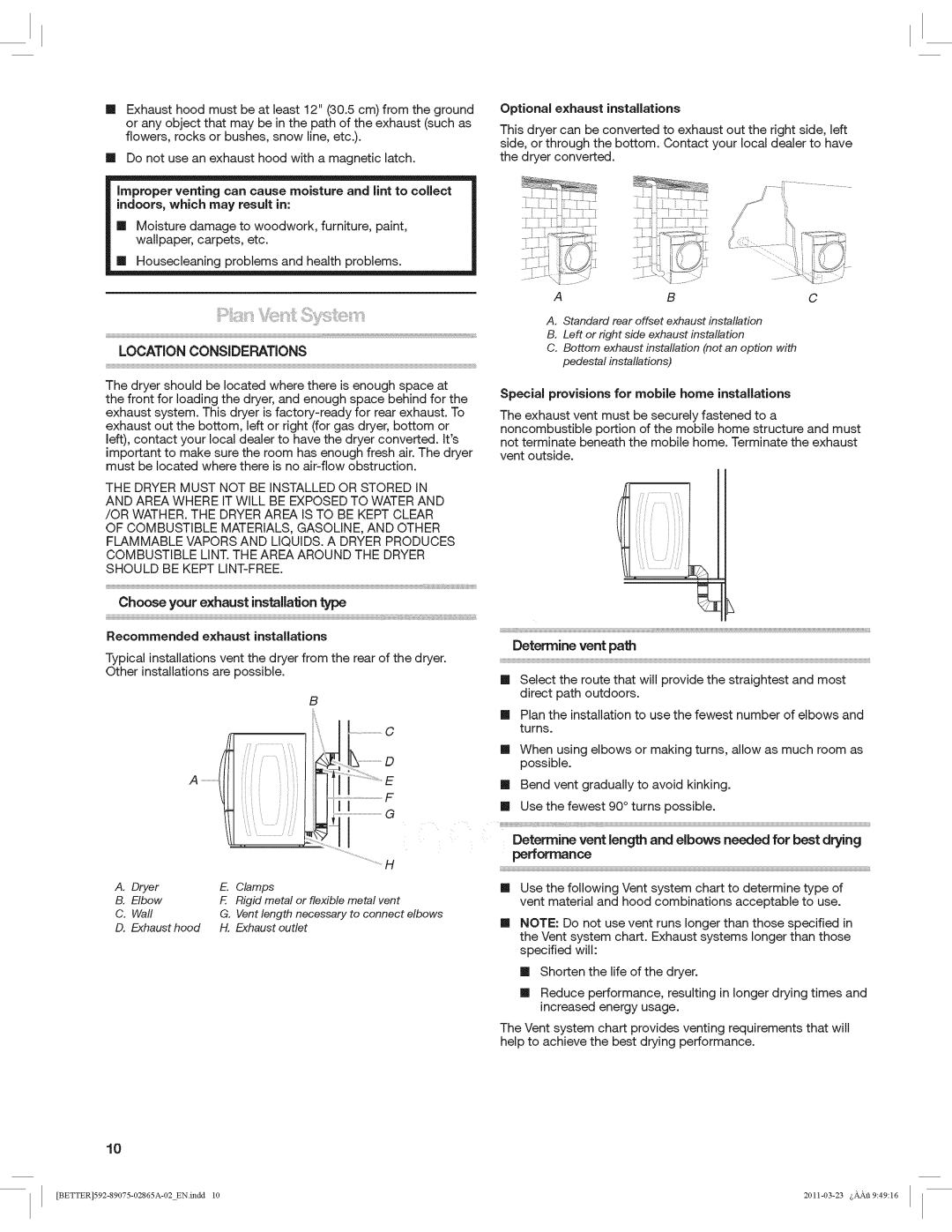
I
[] Exhaust hood must be at least 12" (30.5 cm) from the ground or any object that may be in the path of the exhaust (such as flowers, rocks or bushes, snow line, etc.).
[] Do not use an exhaust hood with a magnetic latch.
improper venting can cause moisture and lint to collect indoors, which may result in:
[] Moisture damage to woodwork, furniture, paint, wallpaper, carpets, etc.
[] Housecleaning problems and health problems.
LOCATIONCONSiDERATiONS
The dryer should be located where there is enough space at the front for loading the dryer, and enough space behind for the exhaust system. This dryer is
important to make sure the room has enough fresh air. The dryer must be located where there is no
THE DRYER MUST NOT BE INSTALLED OR STORED IN AND AREA WHERE IT WILL BE EXPOSED TO WATER AND /OR WATHER. THE DRYER AREA IS TO BE KEPT CLEAR OF COMBUSTIBLE MATERIALS, GASOLINE, AND OTHER FLAMMABLE VAPORS AND LIQUIDS. A DRYER PRODUCES COMBUSTIBLE LINT. THE AREA AROUND THE DRYER SHOULD BE KEPT
Choose your exhaust installation type
Recommended exhaust installations
Typical installations vent the dryer from the rear of the dryer. Other installations are possible.
B
A......................
A. | Dryer | E. | Clamps |
|
|
B. | Elbow | E | Rigid metal | or flexible | metal vent |
C. | Wall | G. | Vent length | necessary | to connect elbows |
D. | Exhaust hood | H. | Exhaust outlet |
| |
I
Optional exhaust installations
This dryer can be converted to exhaust out the right side, left side, or through the bottom, Contact your local dealer to have the dryer converted,
AB
A. Standard rear offset exhaust installation
B. Left or right side exhaust installation
C. Bottom exhaust installation (not an option with pedestal installations)
Special provisions for mobile home installations
The exhaust vent must be securely fastened to a
noncombustible portion of the mobile home structure and must not terminate beneath the mobile home. Terminate the exhaust
vent outside.
Determine vent path
[] Select the route that will provide the straightest and most direct path outdoors.
[] Plan the installation to use the fewest number of elbows and turns.
[] When using elbows or making turns, allow as much room as possible.
[] Bend vent gradually to avoid kinking.
[] Use the fewest 90 ° turns possible.
i | t | i |
Determine vent length and elbows needed for best drying performance
[] Use the following Vent system chart to determine type of vent material and hood combinations acceptable to use.
[] NOTE: Do not use vent runs longer than those specified in the Vent system chart. Exhaust systems longer than those specified will:
[] Shorten the life of the dryer.
[] Reduce performance, resulting in longer drying times and increased energy usage.
The Vent system chart provides venting requirements that will help to achieve the best drying performance.
10
10 | i,_ft | 9:49:16 | I | |||
|
|
|
